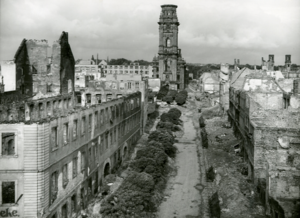Hans Löffler
*22 June 1872 in Karlstadt am Main † 7 September 1955 in Würzburg
1891 Abitur at the Old Grammar School
Law studies
1895 First state exam
1899 Second state exam
1899 Legal expert Magistrate Council
1919 Deputy Mayor of Würzburg
1921 Mayor of Würzburg
1933 Forced resignation
1945 Reconstruction Commissioner of the government of Lower Franconia
1946 Second term as Lord Mayor of Würzburg
In two terms as Lord Mayor, Hans Löffler led Würzburg through the crises of inflation and reconstruction before and after the Third Reich. The former law student of the JMU as well as honorary citizen and honorary senator of the university is therefore to be presented as "alumnus of the month" at the start of the winter semester 2019/20.
Arrival in Würzburg
Hans Löffler grew up at a time when the emerging industrialization and the associated changes had a strong impact on society. As the son of a royal Bavarian fire insurance inspector, he felt he belonged to a "better family" and saw it as his duty to excel at school with top performances. The early death of his father robbed him of his only male role model. Despite this loss, Löffler strove for an extensive academic education. His admission to the Old Grammar School was one of the main reasons for the family's move from Karlstadt to Würzburg.
For Löffler, the subsequent study of law went hand in hand with active participation in liaison affairs. Thus he spent a large part of his student life for membership in the Corps Bavaria.
A life for the civil service
After passing the second examination for higher judicial and administrative service at the beginning of 1899, Löffler worked for a short time for a lawyer. However, he did not like this very much, so he entered the service of the city in October of the same year and thus continued his father's tradition as a civil servant. Shortly afterwards, the 28-year-old lawyer was unanimously elected to the legal expert Magistrate Council and confirmed in this office in 1903. In the following years, Löffler was to assume various positions in the city administration, among other things he was responsible for the administration of the war economy during World War I. Löffler was a civil servant through and through and distinguished himself in particular through his diligence and his strict service and thus embodied exemplarily the virtues of the German civil service of the empire.
Work in Würzburg
With a considerable majority of 10,758 out of 10,768 votes, Hans Löffler was elected Mayor of Würzburg in a direct popular election on 13 February 1921. Due to his many years of experience in the city administration, he was able to carry out this office with great expertise. Here he was regarded as an extremely diligent and conscientious office holder, who understood himself as a non-party representative of the city. His work in and for Würzburg at that time had a significant influence on the city; even today, numerous testimonies of his work can be found. During his activity the Würzburg Flying School and the "New Würzburg Tramways GmbH" were founded, the Luitpold hospital was completed, the waterworks "Lower Main Mill" were put into operation and in 1930 the district Heidingsfeld was incorporated. At the same time, Löffler succeeded during his tenure as Lord Mayor in leading the highly indebted Würzburg out of its precarious financial situation, which threatened to crush the city as a result of the defeat in the war and the emerging world economic crisis.
Expulsion and return
Löffler saw himself as a defender of Weimar democracy and backed Hindenburg's election as President of the Reich. This opposition to Hitler led to Löffler's forced resignation after the Nazis seized power in 1933. He was forced to leave Würzburg and move to Chieming. His longing for the city on the Main remained, however, and so Löffler returned after the destruction of Würzburg, driven by the desire to help with the reconstruction. After initial hesitation, Löffler finally offered his help and, thanks to his political contacts, was soon able to assume the post of Reconstruction Commissioner of the government of Lower Franconia. After he had found his political home in the CSU, his hopes were fulfilled and Löffler was able to run for Mayor again thanks to the resignation of his predecessor. With the assumption of this office, he also took on the mammoth task of rebuilding the almost completely destroyed city, a task to which he devoted himself to until his resignation on July 1, 1948, with the already known diligence and eagerness.
Recommended Reading:
Stickler, Matthias: Neuanfang und Kontinuität: Würzburg in der Weimarer Republik. In: Ulrich Wagner (Hrsg.): Geschichte der Stadt Würzburg. Band III/1–2: Vom Übergang an Bayern bis zum 21. Jahrhundert. 2007, Theiss, Stuttgart 2001–2007.



